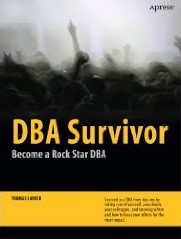 When we get a “SQL book” handed to us, it’s usually to solve a specific technical problem. Maybe you need to understand how to write a PIVOT statement, read a query plan, set up a fail over cluster, or automate something with power shell. It’s a rare occasion when we come across a book that steps back from the daily tactical struggles and gives us a strategic view of what it takes to be a DBA and where to start when thrown in to the shark infested waters of corporate database administration.
When we get a “SQL book” handed to us, it’s usually to solve a specific technical problem. Maybe you need to understand how to write a PIVOT statement, read a query plan, set up a fail over cluster, or automate something with power shell. It’s a rare occasion when we come across a book that steps back from the daily tactical struggles and gives us a strategic view of what it takes to be a DBA and where to start when thrown in to the shark infested waters of corporate database administration.
Arriving with only a little bit of fanfare (and maybe a 2-3 angel choir) is DBA Survivor by notable #sqlfamily member, Tom LaRock(b|t). It’s advertised by Tom as the book he wishes someone had handed to him when he first became “the DBA”. A fresh approach to career development, the book finds a nice middle ground between purely technical guides and the generic career success compilations. Sure, there’s some technical sections that talk about about Dynamic Management Views, performance metrics, and backups, but the real meat is the “fuzzy” bits, such as instruction on defining daily check lists, writing Service Level Agreements, handling the work/life balance, and getting involved in the community.
While I enjoyed the entire book (all 171 pages!), several key parts stuck out for me. First is the discussion about Mr. Right versus Mr. Right Now. We’ve all seen the superheroes on our teams, the guys who drop everything to fix a problem (but don’t always fix it the right way). A former boss of mine called these folks “White Knights” or, as Tom labels them, “Mr. Right Now”. Contrast this with “Mr. Right”, who is rarely seen because when he’s on the case, things don’t break. He’s the DBA that’s proactive about attacking problems before they become crises, and when things do break he fixes them such that things don’t break again. To often we get caught up in the moment, trying to put out the immediate fires, that we lose sight of the long term. I’m glad that Tom takes the time to delineate between these two roles and emphasizes that, while we need to be Mr. Right Now sometimes, our goal needs to be Mr. Right.
Secondly, it’s nice to see a database book that instructs you about the importance of disconnecting from work. We’ve all been there: 60+ hour weeks, all-nighters, the on-call shifts from hell. The IT industry can run people ragged and burn the tech love right out of them if they’re not careful. I’m glad that Tom includes a chapter on maintaining that balance between your job and your life, because this is another area that so often gets lost in the moment. Steve Jones(b|t) often talks about life being to short to work a job you don’t enjoy, and this is very much an extension of that philosophy. You can be a great DBA and not work yourself to the bone, it’s just a matter of understanding when you should put the Blackberry down.
Finally, it should be no surprise that Tom has a chapter on community. I’ll wager most of you reading this already understand the benefits of the PASS organizations and local user groups, but many folks picking this book up may not. By including a discussion on connecting through user groups and professional organizations, Tom offers the new DBA an avenue towards excellence. I’ve seen the benefits of PASS and keep catching myself saying “If I had only gotten in to this years ago….” If I had read Tom’s book then, I probably would have.
Now many folks probably think this is just a book for the junior DBA, for someone who’s just getting started, but I know this book has value for data professionals of all levels. This book is not a detailed guide or roadmap for solving specific problems, but a series of highway sign posts to get people headed in the right direction. Maybe you are a fresh DBA, looking to get in to the industry or just survive your first week on the job. Or maybe you’re like me, a career DBA who is looking to refocus my career and looking for that “big picture view”. No matter how you got here, DBA Survivor is an excellent starting point for the rest of your database career.

 I’m tweeting!
I’m tweeting!